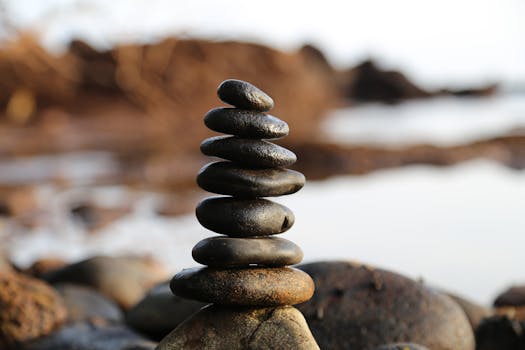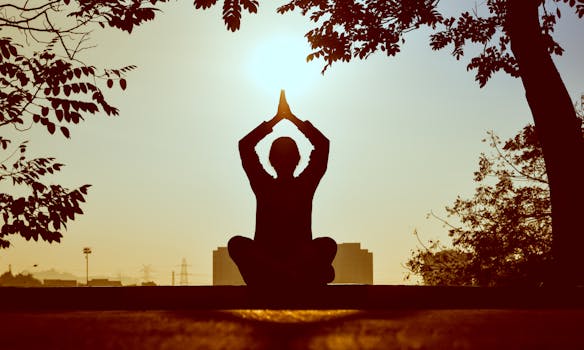
“
Mindfulness Practices for Stress Relief: A Guide to Reducing Anxiety
Mindfulness practices for stress relief have become increasingly popular in recent years, and for good reason. With the demands of modern life, it’s easy to get caught up in stress and anxiety. However, by incorporating mindfulness practices into your daily routine, you can reduce your stress levels and improve your overall well-being. In this article, we will explore the benefits of mindfulness practices for stress relief and provide a comprehensive guide on how to get started.
What is Mindfulness?

Mindfulness is the practice of being present in the moment, paying attention to your thoughts, feelings, and sensations without judgment. It involves cultivating a non-judgmental awareness of the present moment, allowing you to respond to situations more skillfully. Mindfulness is not just a technique, but a way of living that can help you develop greater clarity, calmness, and compassion in your daily life.
Benefits of Mindfulness Practices for Stress Relief

The benefits of mindfulness practices for stress relief are numerous. Some of the most significant advantages include:
- Reduced stress and anxiety: Mindfulness practices have been shown to decrease the production of stress hormones like cortisol, leading to a decrease in anxiety and stress levels.
- Improved sleep: Mindfulness practices can help improve sleep quality by teaching you how to relax and calm your mind and body.
- Increased focus and concentration: Mindfulness practices can improve attention and focus by training you to stay present and aware.
- Enhanced self-awareness: Mindfulness practices can help you develop a greater understanding of yourself, including your values, goals, and motivations.
- Boosted mood: Mindfulness practices can increase the production of neurotransmitters like serotonin and dopamine, leading to improved mood and reduced symptoms of depression.
Mindfulness Practices for Stress Relief

There are many mindfulness practices that can help with stress relief, including:
- Meditation: Meditation involves focusing your attention on a single point, such as the breath, a mantra, or a physical sensation. Regular meditation practice can help reduce stress and anxiety by teaching you how to calm your mind and body.
- Yoga: Yoga combines physical postures, breathing techniques, and meditation to promote relaxation and reduce stress. Yoga can help improve flexibility, balance, and strength while also reducing symptoms of anxiety and depression. For more on the benefits of yoga, check out this article.
- Deep breathing exercises: Deep breathing exercises involve focusing on the breath, often by slowing it down and making it more deliberate. This can help calm the nervous system and reduce stress and anxiety.
- Progressive muscle relaxation: Progressive muscle relaxation involves tensing and relaxing different muscle groups to release physical tension and promote relaxation.
- Mindful walking: Mindful walking involves paying attention to the sensation of your feet touching the ground, the movement of your legs and arms, and the rhythm of your breath. This can help you cultivate a sense of calm and awareness.
Getting Started with Mindfulness Practices

Getting started with mindfulness practices is easier than you think. Here are some tips to help you get started:
- Start small: Begin with short periods of mindfulness practice, such as 5-10 minutes a day, and gradually increase as you become more comfortable with the practice.
- Find a quiet space: Identify a quiet, comfortable space where you can practice mindfulness without distractions.
- Focus on the breath: Bring your attention to the breath, noticing the sensation of the air entering and leaving the nostrils.
- Be gentle with yourself: Remember that mindfulness is a practice, and it’s okay if your mind wanders. Gently bring your attention back to the present moment without judgment.
- Make it a habit: Incorporate mindfulness into your daily routine, such as right after waking up or before bed. For additional insights on establishing habits, refer to this post.
Conclusion

Mindfulness practices for stress relief offer a powerful tool for reducing anxiety and improving overall well-being. By incorporating mindfulness into your daily life, you can cultivate a greater sense of calm, clarity, and compassion. Remember to start small, be gentle with yourself, and make mindfulness a habit. With regular practice, you can experience the many benefits of mindfulness and improve your overall quality of life. If you’re interested in exploring more ways to enhance your lifestyle, check out this article.
See more:
https://www.mindful.org/
https://www.headspace.com/
https://www.calm.com/





